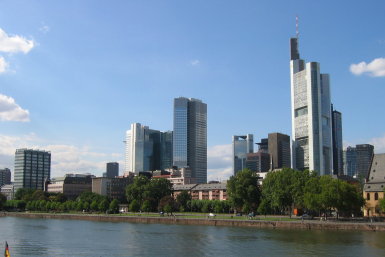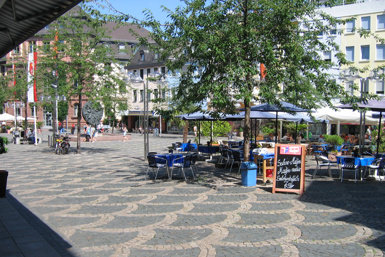German Nouns

In this lesson, you'll learn about nouns in the German language. you'll also learn how to form the plural of German nouns.
You'll also learn the German numbers from one to ten, as well as the German words for some common colors.
A short conversation is included to help you improve your comprehension of the German language.
Flashcards are included at the end of the lesson to help you learn the German words that are introduced in this lesson.
Advertisement
German Conversations
Read and listen to the following conversation between Stefan, Lukas, and Hannah. Note that Lukas and Hannah use the polite version of you, since they have just met. Some people will use the informal version of you even if they have just met. To be safe you should use the polite version of you when talking to people you have just met.

German
Stefan und Hannah gehen zum Mittagessen in ein Restaurant. Unterwegs sehen sie Stefans Freund Lukas.
Stefan: Hallo Lukas. Wie geht's?
Lukas: Gut.
Stefan: Dies ist Hannah. Sie kommt aus Bremen.
Lukas: Freut mich Sie kennen zu lernen.
Hannah: Auch schön Sie kennen zu lernen. Haben Sie Hunger? Wir gehen zum Mittagessen.
Lukas: Ich habe Hunger, aber ich muss wieder arbeiten. Vielleicht sehen wir uns später.
Hannah: Tschüss.
Stefan: Lass uns gehen. Jonas ist schon da.
English
Stefan and Hannah are walking to a restaurant for lunch. On the way they see Stefan's friend Lukas.
Stefan: Hi Lukas. How's it going?
Lukas: Good.
Stefan: This is Hannah. She is from Bremen.
Lukas: Nice to meet you Hannah.
Hannah: Nice to meet you too. Are you hungry? We're going for lunch.
Lukas: I'm hungry, but I have to go back to work. Maybe I'll see you later.
Hannah: Bye.
Stefan: Let's go. Jonas is already there.
Umlauts
| ä | Pronounced like the a in day or like the e in bed when followed by two or more consonants. |
| ö | This sound is not in English. Pronounced similar to the u in fur. |
| äu | Pronounced like the oy in toy. |
| ü | This sound is not in English. Pronounced similar to ew in new but with the lips more rounded. |
Nouns
A noun is a word that represents a person, place, thing, idea, or concept. In written German, nouns are always capitalized.
All nouns in German have a grammatical gender of either feminine, masculine, or neuter. It's better to think of the grammatical gender as just a category of noun, and not literally, as that can lead to errors. For example, the German word for person is feminine, even if it's a male person.
The gender of the noun affects the form of the definite article, indefinite article, and adjectives related to it. Don't worry too much about that now, it will be covered in other lessons, with lots of examples.
German nouns can form the plural in several different ways. Masculine nouns usually form the plural by adding an e. Feminine nouns usually add an n, en, or occasionally e. Neuter nouns usually add either an e or er. Sometimes a vowel changes in the word in the plural form as well. The same can also happen in English. For example the plural of man in English is men.
When learning a new German noun, it's best to learn the noun along with its plural form and the definite article (the in English) along with it.
The following table shows some examples of German nouns, along with their plural forms and corresponding definite article.
| Singular | Plural | English |
| der Tisch | die Tische | the table |
| der Berg | die Berge | the mountain |
| der Ball | die Bälle | the ball |
| der Tag | die Tage | the day |
| der Schuh | die Schuhe | the shoe |
| die Tasche | die Taschen | the pocket |
| die Frau | die Frauen | the woman |
| die Hand | die Hände | the hand |
| die Stadt | die Städte | the city |
| die Nacht | die Nächte | the night |
| die Mutter | die Mütter | the mother |
| das Ding | die Dinge | the thing |
| das Bier | die Biere | the beer |
| das Haar | die Haare | the hair |
| das Kind | die Kinder | the child |
| das Bild | die Bilder | the picture |
| das Buch | die Bücher | the book |
| das Radio | die Radios | the radio |
Examples
Here are some examples of how to use nouns in simple sentences.
| Die Frau ist hier | The woman is here |
| Der Tisch ist braun. | The table is brown. |
| Der Berg ist hoch. | The mountain is tall (high). |
| Das Kind ist müde. | The child is tired. |
| Die Schuhe sind hier. | The shoes are here. |
| Die Nächte sind warm. | The nights are warm. |
| Die Bücher sind neu. | The books are new. |
Advertisement
Numbers
Here are the German numbers from 1 to 10. Have a look at the lesson Numbers for more German words for numbers.
| 0 | null |
| 1 | eins |
| 2 | zwei |
| 3 | drei |
| 4 | vier |
| 5 | fünf |
| 6 | sechs |
| 7 | sieben |
| 8 | acht |
| 9 | neun |
| 10 | zehn |
Die Farben (Colors)
Here are the German words for some common colors. Have a look at the lesson Colors for more German words for colors.
 Gelb (Yellow)
Gelb (Yellow) Blau (Blue)
Blau (Blue) Weiß (White)
Weiß (White) Grau (Grey)
Grau (Grey) Braun (Brown)
Braun (Brown) Schwarz (Black)
Schwarz (Black) Rot (Red)
Rot (Red) Grün (Green)
Grün (Green)Noun Flashcards
Here are some flashcards to help you learn the German nouns introduced in this lesson.
Quiz
This quiz covers the German nouns, words for colours, and numbers included in this lesson. Each time you take the quiz the questions will be a bit different.